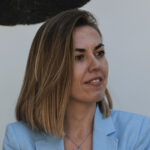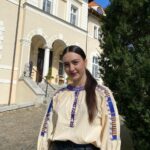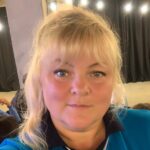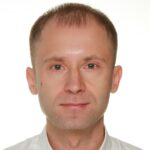Participating in this project reinforced my belief in proactive involvement. I’ve always been an active individual, and through initiatives like this, I’ve honed my skills, particularly in information dissemination. I’ve learned that my age or experience doesn’t limit my ability to share insights or make recommendations. Since this project, I’ve found myself confidently advising my colleagues on media literacy and disinformation.
Youth Media Sharks was a project to enhance media literacy among young people and addressed challenges like COVID-19 misinformation and the Russian-Ukrainian conflict. Participants from Portugal and Ukraine analysed media content, created awareness campaigns and developed an info-kit for their peers. This initiative bridged cultural gaps and equipped young individuals with essential media navigation skills.
In this project, ‘youth participation’ meant young people becoming leaders. They started by learning from mentors. As they gained knowledge, they took charge of the project. They not only learned about media literacy but also understood its wider importance. They felt driven to spread its significance among their peers. It’s crucial that they weren’t viewed simply as beginners, but rather as contributors making a meaningful impact.
Anastasia Mazur, the project coordinator, provides insights into the project’s inception and its impact.
Please tell us a bit about your background.
I’m the president of the association My Mother Island based in Madeira, Portugal. My roots trace back to Ukraine, and I have a profound connection with our Ukrainian partner, the Center for Euroinitiatives. This association is where I began my journey in non-formal education, and they’re like family to me. I previously worked there, and upon relocating to Madeira our organisations naturally partnered due to our shared history and mutual trust. On the Ukrainian side, I was joined by Larysa, who managed the Youth Media Sharks project. She played a key role from conceptualising to overseeing the project’s execution.
What sparked your project idea?
I’ve been involved in journalism for over ten years, and media literacy is a topic I deeply care about. Our planning for the project started in spring 2021, during the height of the COVID-19 pandemic. The internet was filled with all sorts of information about the virus, from vaccine details to misleading advice.
Seeing the need to address this flood of information, we were lucky that Erasmus+ launched youth activities at that time. After speaking with our teams in Ukraine and Portugal, we saw a strong desire to address this issue. We created a project plan, which was approved in August 2021.
We began by setting up the platform and website. Then the situation in Ukraine changed again. With the war and the ongoing pandemic, sharing accurate information became even more important. Our project’s importance grew exponentially in this setting.
How did the war affect your project?
A few months into the conflict, our Ukrainian team felt the need to adjust our project’s focus. While we started with an emphasis on COVID-19, the ongoing war in Ukraine and the spread of disinformation, especially from the Russian side, made us realise the broader importance of our mission. This wasn’t just theory; it was real and relevant in these challenging times.
I spoke with the national agency in Portugal about adapting our project and broadening our scope to include ‘info wars’. The National Agency was supportive, as long as we stayed true to our main goals of promoting media literacy, critical thinking and democratic participation. This support strengthened our determination.
Our Ukrainian team agreed on the importance of teaching young people about misinformation and understanding info wars. While we still addressed COVID, the project took on a deeper meaning in the Ukrainian context.
Could you share the challenges related to project implementation in wartime?
One of the hardest tasks was organising Ukrainian activities during the airstrike alerts. Making sure the participants were safe was our top priority, which meant thinking about things like bomb shelters and preparing for possible emergencies during events. Their main worry was keeping everyone safe.
The efforts of the Ukrainian team were truly remarkable, especially during times when the electricity was unstable. For context, there were instances when power plants were targeted, resulting in sporadic electricity availability – two hours on and two hours off. In contrast, when collaborating with partners on different projects, some might offer various reasons for not sending documents or completing tasks. However, when communicating with Larysa’s dedicated team, they’d say, ‘If the electricity goes out during our online call, I’ll head to the next street where there’s power and rejoin the call. Or if I’m uploading documents to Google Drive and the power cuts off, the upload might not complete. Please bear with me during such instances.’
What were the main activities of the project?
From the start, groups of young individuals from both Portugal and Ukraine were deeply involved. They explored discussions about the repercussions of disinformation, especially concerning COVID-19 and the humanitarian crisis. They took the initiative to research local media and social networks, pinpointing prevalent misinformation.
One of the highlights was the creation of an info-kit. This kit was designed by young people, for young people, offering guidance on verifying media information, unmasking disinformation and directing them to credible sources. They didn’t stop there; they also launched an awareness campaign focusing on media literacy and the importance of discerning genuine information.
Overall, our main goal was to increase awareness about media literacy in a way that truly connects with young people. From the start, the participants realised that the content needed to be simple and relatable for the young audience. The participants made eye-catching posters and used language that the youth would understand. This included adding humour, using popular topics and choosing images that appeal to them. They worked hard, using meme tools and coming up with creative ideas.
In terms of tangible outcomes, they formulated recommendations for local stakeholders in areas like public health, education and information. Their goal was to increase youth resilience against disinformation, especially in the context of the ongoing pandemic and the broader crises in Europe.
In Ukraine, despite the challenges, a group of around 10 young individuals consistently came forward. They organised events, conducted research and even participated in a youth exchange in Madeira.
While our initial target was to engage 30 young individuals in media literacy workshops in both countries, the actual turnout exceeded our expectations. In Madeira alone, over 40 youngsters attended our workshops. Moreover, during our youth exchange, we expanded our reach by visiting educational institutions in Madeira where we introduced at least 100 more young individuals to media and digital literacy.
How did you support the Ukrainian and Portuguese groups working together in Madeira?
When the Ukrainian group initially arrived in Madeira, they weren’t sure how they’d talk to the local young people because of the language difference. They first believed it might be hard to get their points across, but they found out they could communicate not just with words but also using hand signs and facial expressions. The feeling was friendly and welcoming. In Ukraine, people often say ‘make yourself at home’. To make this friendly feeling stronger, when they worked with the young people in Portugal, they added fun activities and games to their meetings. They also had open talks which helped everyone understand each other better. Maybe the most important part of this project, looking at the young people from both Ukraine and Portugal, is how much each person learned and grew.
When the team from Ukraine came to Madeira, a peaceful place, the sirens from the firefighter stations unexpectedly reminded them of the air strike alerts they were used to back home. This detail, which I hadn’t thought of, immediately brought back traumatic memories for them. Thinking about this, it’s clear that these young people have faced challenges that many of us can’t fully understand. Yet, their bravery, commitment, teamwork and strength stood out.
The Ukrainians felt it was important, especially with the tough times in their home country, to visit another country. Spending time with young people in Portugal was valuable, and getting to know a different culture was special. One memorable moment was training with Portuguese students. The Ukrainians remember talking to two boys who only spoke Portuguese. They used a translator to help with the conversation, and it was successful.
Both young and adult Portuguese locals were genuinely pleased to welcome the Ukrainians. The team also had an interview with a local newspaper. It was particularly impressive by how the local journalists framed the story. They emphasised, ‘Take a closer look. These aren’t refugees. These are young individuals here on an educational project, aiming to share insights about media literacy and engage in cultural exchange with the Portuguese.’
What was it like for the young people to share their ideas with local leaders in Ukraine?
The young people talking with the town’s leaders was really interesting. The young group made suggestions about how to share information and different ways to do it. This kind of deep involvement with the local leadership was something new for our group. It’s important to say that the leaders didn’t show any discontent or frustration, mainly because the young people were ready and knew their stuff. They pointed out problems and explained why, showing they really understood the topic and had thought things through.
In conclusion, what were some of the most important insights gained during the project?
Initially, the participants consumed information by actively participating in trainings, understanding media literacy, fact-checking techniques and more. As their knowledge grew, they started to incorporate their learnings into the materials they created.
For example, the participants created various memes centred on media literacy, which is an innovative approach to spread awareness among youth. Watching those memes, the amazing creativity of our young participants was clear. Even when talking about serious topics, they added humour and found a balance between seriousness and lightheartedness. Their work was a great mix of information and fun.
In fact, some of the participants weren’t originally very interested in journalism. However, this project gave them a valuable opportunity. They now clearly see the need to find and check primary sources. They examined various platforms, which helped them make important observations about media habits. Many outlets use catchy headlines to get attention, even if they might not be true. This discovery made them more careful, making sure they read the whole article and not just the headline. The young people also understood how important it is to tell facts from opinions. These ideas can sometimes get mixed up, but after the project, they’ve become more astute at telling them apart.
Project outcomes
Website
About the project
Supported by:
Erasmus+
EU Youth Programme Priority:
Digital Transformation
Topic:
Media, Information & Critical Thinking
Digital Participation
Youth Goals:
Visibility:
The main target audience was young individuals aged 13-30 in Sumy (Ukraine) and Madeira (Portugal), but the online campaign expanded this reach nationally and internationally. The project was also aimed at youth workers, educators and regional stakeholders in both countries. Various communication channels, including social media platforms like Instagram and TikTok, were utilised to disseminate information. The project results and materials were shared both digitally and during physical events, with significant contributions from young participants who created content, gave interviews and even developed a website to showcase their work.
Organisations involved:
Associação My Madeira Island, Center For Euroinitiatives











